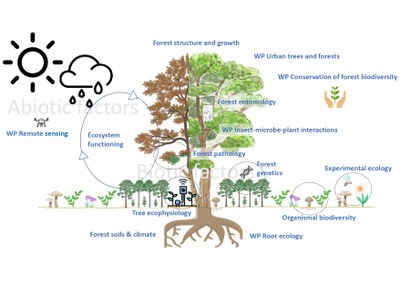Forest Ecology Research
 Forests are highly diverse ecosystems that act as habitats for various organisms, recreation areas for humans, provide timber and other resources and act as carbon sinks. At the same time, they are challenged by rapid climate change, emerging pests and diseases as well as other anthropogenic influences. While forests are threatened, there is a lack of scientists that are specifically trained to study organismal interactions in these ecosystems with modern methods. They are currently searched in university and non-university research to help understand how our forests can respond to the challenges mentioned. In the focus area “Forest Ecology Research”, students will learn state-of-the-art research techniques to address pressing questions in forest ecosystems – ranging from unraveling interactions between trees with their biotic and abiotic environment by incorporating all scales from the molecular to the landscape level.
Forests are highly diverse ecosystems that act as habitats for various organisms, recreation areas for humans, provide timber and other resources and act as carbon sinks. At the same time, they are challenged by rapid climate change, emerging pests and diseases as well as other anthropogenic influences. While forests are threatened, there is a lack of scientists that are specifically trained to study organismal interactions in these ecosystems with modern methods. They are currently searched in university and non-university research to help understand how our forests can respond to the challenges mentioned. In the focus area “Forest Ecology Research”, students will learn state-of-the-art research techniques to address pressing questions in forest ecosystems – ranging from unraveling interactions between trees with their biotic and abiotic environment by incorporating all scales from the molecular to the landscape level.
Important facts about this major
Language: English
Teaching form: on-campus
Pace of study: fulltime
Study location: Freiburg
Start: only in winter term
Duration: 4 Semester
Application periode: March 1st - May 15th
ECTS: 120 ECTS (80ECTS modules, 10 ECTS Internship, 30ECTS Thesis)
Costs: 190€ semester fees, 1.500€ study fees (only non-EU students!)

- Deep insights into the interactions between plants, microorganisms and animals in forests
- Applied research training experiences; regularly in collaboration with other leading forest research institutes
- Field and laboratory research, applying modern microbiological, chemo-ecological, behavioral and molecular techniques as well as data analyses
- Acquire skills relevant for working as an internationally visible researcher
Programe overview ( download pdf)
download pdf)
This is a general overview. Changes are possible. The current semester plan can be found here.
Module details
1) Forests and Global Change
2) Applied Environmental Statistics
- Forests in the age of climate change
- Deforestation and afforestation
- Digitalization in forest management
- introductory module beyond multiple regression
- builds on and extends statistical knowledge and its application
- standard machine-learning approaches in R or Python
- joint module with students from other profile tracks
3) Forests Soils and Climate Change
- Impact of climate change on soil processes
- Forest soils as sink/source of greenhouse gases
- discuss soil-related adaptation of forest management to climate change
4) Analysis of Biodiversity Data
- Biodiversity maesures
- Analyzing species richness and species community composition
- Analysis of biodiversity data in R
5) Genetic and genomic methods in forest management and conservation
- Population genetics of forest trees
- Analysis of genetic data - in the lab and in R
- Learn to present your results in oral and written form
6) Ecosystem Functioning
- Background knowledge on important processes in ecosystems
- overview of ecological approaches and systems
- link to other profile tracks, and to their students
7) Experimental Ecoloogy
- Experimental Design in ecological field research
- Design and carry out your own research project
- Learn to communicate your research research visually, in written and in oral form
8) Tree and Forest ecophysiology
- introduction to tree water and carbon fluxes
- state of the art methods in ecophysiological research including excursion to field sites
- analysis and interpretation of tree ecophysiological data
9) Forest Pathology
- Biology and epidemiology of fungal pathogens
- Detection and isolation of pathogens and identification with molecular methods
- Prepare a scientific report over own conducted field and lab work
10) Forest Entomology
- Ecology of forest insects
- Design and execute your own research project
- Participate communication and publication of results
11) Forest Sciences: Professional and Research Approaches
- Self-perception and external perception of the forestry profession
- Change of forestry and forest sciences in history
- Methods of research and knowledge transfer
12) Forest growth and structure
- Measurement of forest structure based on LiDAR and drone data
- Analysis of three-dimensional forest structure and tree competition
- Multi-scale analyses of forest growth from tree ring to stand level
13) Frontiers in Forest Sciences
- Emerging fields in forest Ecology
- Seminars by leading experts
- learn to challenge and discuss research findings
Target Group
Students with a BSc in the life or natural sciences (e.g. biology, forestry, environmental sciences, ecology) interested in learning research approaches and methods targeted specifically at understanding organismal interactions in forest ecosystems, learning the development of methods to investigate the future challenges forests have to face.
Career Opportunities

- research at universities
- non-university research institutes and national parks
- state departments,
- research in companies
- NGOs
Application

Requirements
- BSc Degree with grade point average of at least 2.5
- English C1
- 55 ECTS in natural sciences and ecology
- -> Proof of floristic and faunistic species knowledge
- -> Population ecology
- 15 ECTS in statistics and geomatics
-> basic knowledge in "R" is assumed
Application periode: March 1st - May 15th
Application portal: HISinOne
further information: see "Application"
Head of Major & Contact
Prof Dr. Peter Biedermann
Chair of Forestentomology and Protection



